
16 Must-Read Books for Game Designers from Beginner to Pro
Dieser Inhalt wurde noch nicht ins Deutsch übersetzt. Wir zeigen Ihnen unten die englische Version.
Do you want to learn more about game design? Are you at the very first stages of creating a game? Encountered difficulties while doing game development? What are some of the best books you should read to learn more? You have come to the right place!
We have gathered some game design materials with basic knowledge of game design from beginner-friendly to intermediate level, whether you have no knowledge at all or just entered the pit to understand how to create different game levels or want to know the game psychology to make an addictive game in the future, we got you all covered!
Beginner Friendly
1. Level Up! The Guide to Great Video Game Design
by Scott Rogers
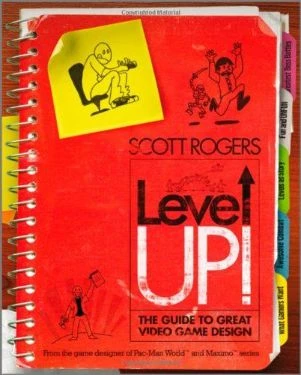
If you want to get your game knowledge foundation, this book has it all in one! It gives you a great understanding of game design including the history of game development, job responsibilities in each position, and basic game concepts with detailed introductions from combat design, enemy design, level design, and lens design. It also explains the reasons behind the game design one by one. The content is simple and clear without any difficult vocabulary or programming language, some of the illustrations in the books are even drawn by the author himself, in short, it's a great start for a beginner even children can understand it perfectly as well.
2. A Theory of Fun for Game Design
by Raph Koster
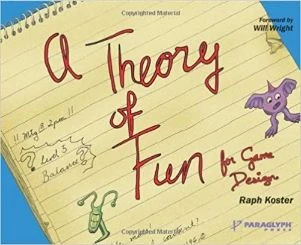
If you ask game designers what books should you read to get you started at least 90% of them will recommend this book, it is not an exaggeration! This is the foundation theory behind rational game design and should be a must-read for any game designer.
This book does not talk about any actual game concepts or game development, you will not learn any game design from the beginning to the end if you are wondering. However, you will learn philosophy about games and why it brings fun, entertainment, and even addiction. If the game designers don't understand the psychology process behind it how are you able to create an addictive game?
3. Challenges for Game Designers
by Brenda Brathwaite and Ian Schreiber
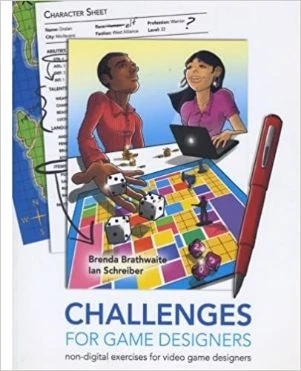
Welcome to a book written to challenge you, improve your brainstorming abilities, and sharpen your game design skills! This book is filled with enjoyable, interesting, and challenging exercises to help you become a better game designer, whether you are a professional or aspire to be.
Each chapter covers a different topic important to game designers and was taken from actual industry experience. After a brief overview of the topic, there are five challenges that each take less than two hours and allows you to apply the material, explore the topic, and expand your knowledge in that area to hone your game designing skills!
4. The Art of Game Design: A Book of Lenses
by Jesse Schell
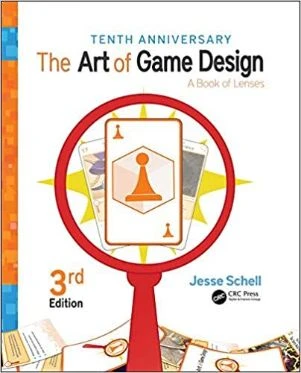
This book teaches you how to be a designer, how to know how to draw on knowledge, listen to people, think practically about making a game and even when you create a game how to operate it such as dealing with bad ideas from customers, how to promote products, and how to negotiate with useful suggestions.
It is an authentic and comprehensive book you will not feel bored at all. It is very suitable for all-around designers who need to coordinate all aspects of game design.
5. Game Feel: A Game Designer's Guide to Virtual Sensation
by Steve Swink
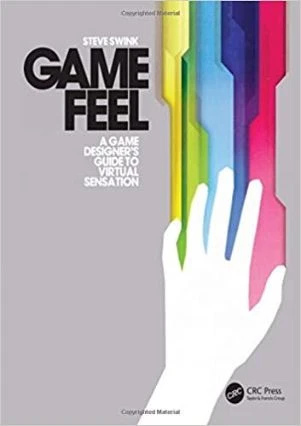
The understanding of how game designers create feel, and affect feel are only partially understood by most in the field and tends to be overlooked as a method or course of study, yet a game's feel is central to a game's success. This book brings the subject of feel to light by consolidating existing theories into a cohesive book.
The book covers topics like the role of sound, ancillary indicators, the importance of metaphor, how people perceive things, and a brief history of feel in games.
6. Blood, Sweat, and Pixels: The Triumphant, Turbulent Stories Behind How Video Games Are Made
by Jason Schreier
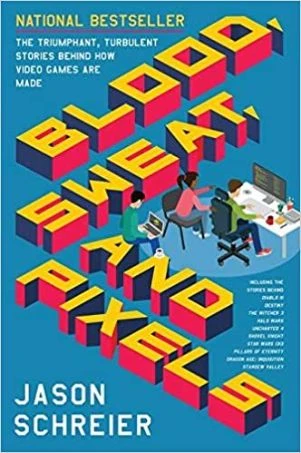
Developing video games—hero's journey or fool's errand? This books give you a perspective to explore the game developments artistic challenges, technical impossibilities, marketplace demands, and Donkey Kong-sized monkey wrenches thrown into the works by corporate. This book does not disappoint.
Taking ten games, ranging from indie developer to the most high-profile games made in the last decade, the author investigates the production process to determine what does it take to make a hit game. The stories of each game's development are well crafted and told expertly. Each story had its own twists, its own suspense, sometimes ending in triumph, other times ending in sadness. Recommend for anyone who is interested in working in the gaming industry.
7. Think Like A Game Designer: The Step-by-Step Guide to Unlocking Your Creative Potential
by Justin Gary
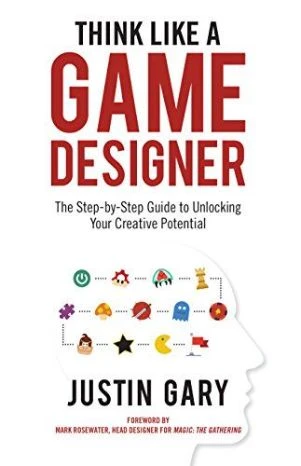
Do you have ideas for games of your own and want to learn how to produce them professionally? Like the title, this book shapes you to be a game designer and gives you simple, practical, and common-sense steps to get your hands on easily. The author walks through a step-by-step process to turn your idea into a finished game and gives guidance about how to think about each step and improve your skills as you go along.
In Think Like a Game Designer, you will learn how to overcome mental blocks to great creative work, understand players’ emotional reactions and evoke the right ones, brainstorm ideas and then refine them into useable ones, follow the six steps of the core design loop for successfully designing a game, get a job in the game industry and get your games published, integrate monetization into your design and deliver an enjoyable experience to your players so your game stands the test of time!
8. The Ultimate Guide to Video Game Writing and Design
by Flint Dille and John Zuur Platten
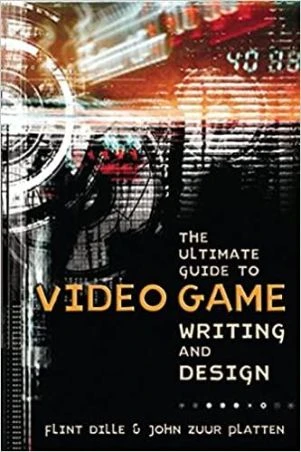
How do you find game inspirations? How do you write an attractive game script and storyline? There are books about creating video games out there. Sure, they cover the basics. But The Ultimate Guide to Video Game Writing and Design goes way beyond the basics. The authors, top game designers, focus on creating games that are an involving, emotional experience for the gamer. Topics include integrating story into the game, writing the game script, putting together the game bible, creating the design document, and working on the original intellectual property versus working with licenses. Finally, there’s complete information on how to present a visionary new idea to developers and publishers.
Intermediate Level
9. Characteristics of Games
by George Skaff Elias, Richard Garfield, K. Robert Gutschera
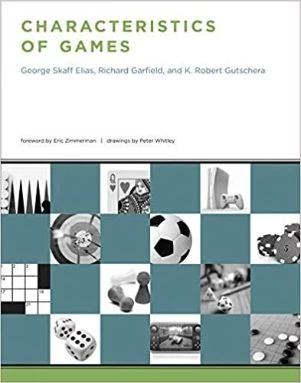
This book offers a new way to understand games: by focusing on certain traits--including numbers of players, rules, degrees of luck and skill needed, and reward/effort ratio--and using these characteristics as basic points of comparison and analysis. These issues are often discussed by game players and designers but seldom written about in any formal way.
The book shows what all genres of games whether it is board games, card games, computer games, and sports have some traits that can teach each other. Today's game designers may find solutions to design problems when they look back at classic games that have evolved over years of playing.
10. Designing Games: A Guide to Engineering Experiences
by Tynan Sylvester
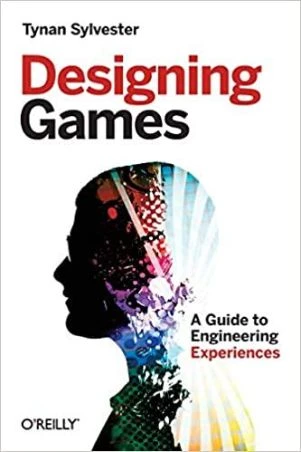
Ready to give your design skills a real boost? This eye-opening book helps you explore the design structure behind most of today’s hit video games. You’ll learn principles and practices for crafting games that generate emotionally charged experiences—a combination of elegant game mechanics, compelling fiction, and pace that fully immerses players.
In clear and approachable prose, design pro Tynan Sylvester also looks at the day-to-day process necessary to keep your project on track, including how to work with a team, and how to avoid creative dead ends. Packed with examples, this book will change your perception of game design.
11. Introduction to Game Design, Prototyping, and Development: From Concept to Playable Game with Unity and C#
by Jeremy Gibson
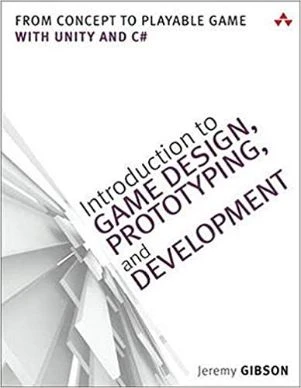
The author teaches game design at Michigan State University and has spent the last decade working as an independent game developer. Over the years, his most successful students have always been those who effectively combined game design theory, concrete rapid-prototyping practices, and programming skills. In this book, he gives you all.
Anyone who is looking to get familiar with Unity should learn from this book as Unity is the top game engine for cross-platform game development allows you to write a game once and deliver it to everything from Windows, OS X, and Linux applications to webpages and all of the most popular mobile platforms. If you still want to learn more after this book check out the author's YouTube videos too!
12. A Game Design Vocabulary
by Anna Anthropy and Naomi Clark
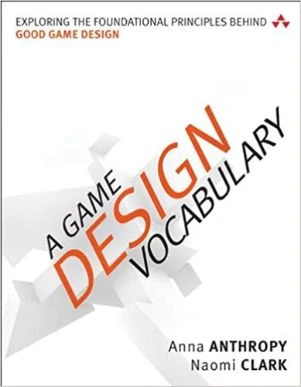
Have you ever wonder why aren’t games helping us transform our lives, like great music, books, and movies do? Why does it feel like we’re playing the same games, over and over again? The problem is language. We still don’t know how to talk about game design. We can’t share our visions. We forget what works (and doesn’t). We don’t learn from history. It’s too hard to improve.
A Game Design Vocabulary gives us the complete game design framework we desperately need—whether we create games, study them, review them, or build businesses on them. In this book, it shares foundational principles, examples, and exercises that help you create great player experiences, complement intuition with design discipline and craft games that succeed on each level. If you are stuck and needed a breakthrough this book might give you some new ideas!
13. The Gamification of Learning and Instruction Fieldbook
by Karl M. Kapp, Lucas Blair and Rich Mesch
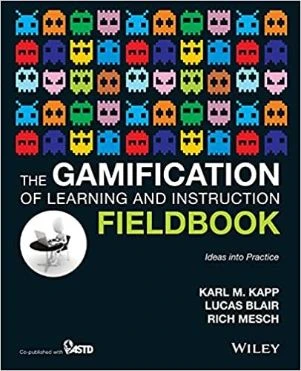
When you are designing games do you wish to have guidance? Then this book is the one for you! It gives you essential principles by which to design, develop, and create interactive, high-impact learning experiences.
It is important to keep in mind that this is a field book. The co-editors provide worksheets, examples, samples, tables, and instructions that can help readers create their own game design path and even help teams in the midst of creating games, gamification, and simulation projects.
14. Game Design Workshop: A Playcentric Approach to Creating Innovative Games
by Tracy Fullerton
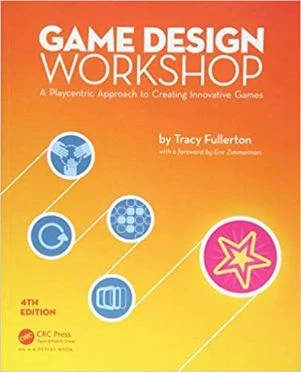
This book helps you to create the digital games you love to play, using a non-technical approach to game design without the need for programming or artistic experience.
Award-winning author Tracy Fullerton demystifies the creative process with clear and accessible guidance on the formal and dramatic systems of game design. Using examples of popular games, illustrations of design techniques, and refined exercises to strengthen your understanding of how game systems function, the book gives you the skills and tools necessary to create a compelling and engaging game.
15. Creativity, Inc.: Overcoming the Unseen Forces That Stand in the Way of True Inspiration
by Amy Wallace and Edwin Catmull
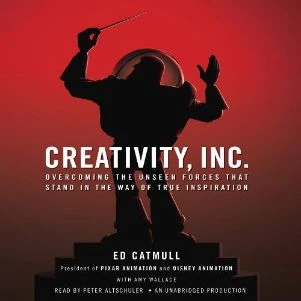
Even if you are in the game industry you have to constantly remind yourself to be creative and think out of the box. Creativity, Inc is an evergreen classic and essential reading for anyone working or interested in creative businesses, high-performance teams, organization change and transformation, innovation, digital media, etc.
Whether you are leading a team of game developers or game designers this book points out where corporations go wrong and even admits Pixar’s own failings, you can also learn how to let employees express themselves creatively and give constructive feedback. If you are trying to grow and have continued success in your gaming business this book is a must-read.
16. Rules of Play: Game Design Fundamentals
by Katie Salen Tekinbas and Eric Zimmerman
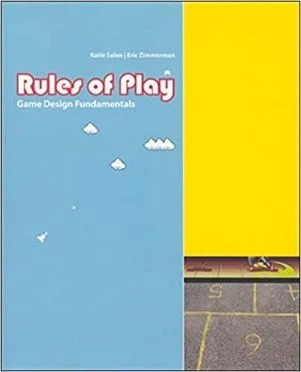
Written for game scholars, game developers, and interactive designers, Rules of Play is a textbook, reference book, and theoretical guide. It is the first comprehensive attempt to establish a solid theoretical framework for the emerging discipline of game design.
This book is cited wide and far in all areas of game research, It is a perfect introduction to game research and academia if you want to dive into the heart of game design, It shows how games can be understood as not just stories or gameplay, but as cybernetic systems, as information systems and many other things.
Conclusion
Reading about game design is like reading about a foreign language: It'll get you familiar, but it won't get you fluent. Other than reading these books you will need to also learn to analyze games by yourself such as how to deconstruct games and know what’s their strengths and weaknesses. Because games aren't sums of their wholes, or stories, the principles that you design games towards are to build a framework of mindsets for the players to immerse themselves in.
Hopefully, all the above books will give you new perspectives and dive deeper into game design eventually shape your career as a professional game designer. If you like these recommendations, feel free to share them with any game designers to be are interested in this topic too! Happy Reading!
Lastly, if you are eager to learn more design information and resources, visit and bookmark Eagle blog to become a better creative professional!
If you are still lacking inspiration and incentives to create something new, feel free to dive into Eagle Community to explore stunning assets shared by thousands of designers worldwide. Let Eagle be your best design assistant!



